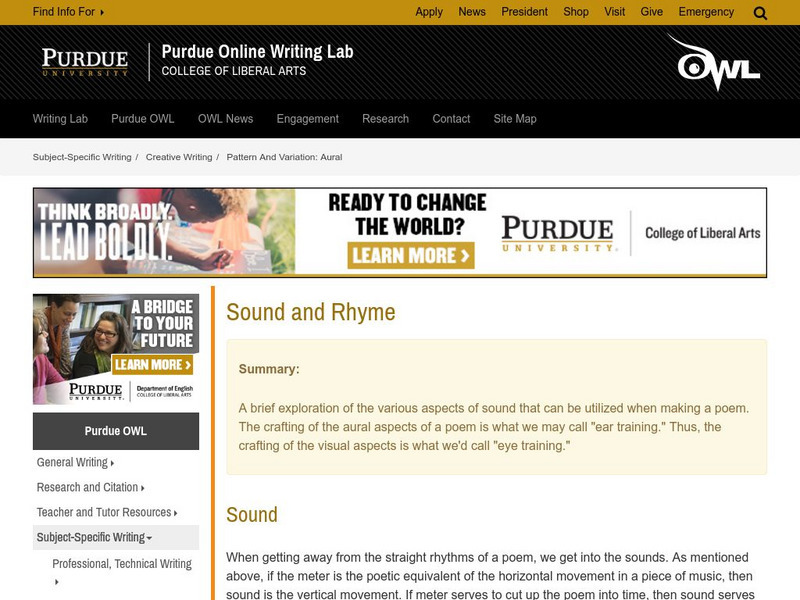Hi, what do you want to do?
Curated OER
Anglo-Saxon Period: An Introduction
Learners read information about Anglo-Saxon rulers and literary techniques, then complete a worksheet to help them review. Students take notes about the oral tradition, Anglo-Saxon literary terms, and Anglo-Saxon poetry. Learners create...
Curated OER
"Tongue Tangle"
First graders engage in a study of phonics that focuses on the beginning sounds with an emphasis upon varying types of genres that includes songs, speech, and poetry. They recognize the beginning sounds of words and make physical...
Curated OER
"Beowulf"
In this literature worksheet, students find the vocabulary terms related to the book of Beowulf. The answers are found at the bottom of the page.
Curated OER
Metaphors
In this metaphor worksheet, students make a "word card" with the word metaphor for their vocabulary bank, then determine whether statement from The Dragonslayer are similes or metaphors,
Curated OER
Solid Waste
Students examine how to use their vocabulary, writing skills, and creative thinking to address environmental concerns in this unit. They write messages to using creative writing to address the issues of solid waste and recycling.
Curated OER
Come Fly With Me...Aviation
Students conduct internet research on aviation and pioneer aviators. They create an alphabet book r with flight related terms, write a short biography of a pioneer aviator and take part in a paper plane flying contest.
Curated OER
How To Identify Figurative Language
Students investigate writing techniques by analyzing a chart. In this figurative language lesson, students define similes, metaphors and identify the difference between them and personification. Students demonstrate their understanding...
Curated OER
Safe from the Storm
Fourth graders read the poem "Snowbound" after brainstorming what a place of refuge is and why it's needed. They, in pairs, meet and write a list of ten attributes that describe a refuge. They write a paragraph describing the look, feel,...
Curated OER
Figurative and literal language through the study of Shakespeare
Sixth graders explore figurative and literal language. They study literary devices through short pieces of Shakespeare's work. Then investigate Shakespeare's works and life.
Curated OER
Perspectives
Seventh graders describe an event, a situation, etc. through the eyes of two people or two inanimate objects.
Ereading Worksheets
Figurative Language for Edgar Allen Poe
Are your classes weary of dreary worksheets? Are the learners nearly napping? Thrill them, fill them with delight with an interactive worksheet that asks them to identify the figurative language Edgar Allen Poe uses to add horror and...
Curated OER
Inspire the Imagination with a Poet Study of Shel Silverstein
Captivating prose opens wondrous doors to critical thinking and language development.
Curated OER
Figuring Out Frost
Fourth graders read "The Runaway" by Robert Frost and analyze it for its literal and symbolic meanings. They compare their personal experiences with the poet's suggestions about youthful attitudes and behaviors. Some nice worksheets are...
Curated OER
Comparatively Speaking
Learners practice creating similes and metaphors together as a class. Individually students create similes and metaphors and illustrate them.
Curated OER
Alphabet Books
Students work with a partner from a different grade level to brainstorm, draft, edit, illustrate and publish alphabet-themed books. They take turns reading the books to each other and conference with a teacher to review their work.
ReadWriteThink
Read Write Think: Alliteration in Headline Poems
In this lesson plan, students will learn or review the topic of "alliteration" in writing. Then each student will create a 25-word headline poem that contains at least three examples of alliteration. [Requires Adobe Reader.]
Other
Centre for Literacy in Primary Education: Poetryline: Poetic Forms and Devices
An excellent resource for learning about the different forms and devices used in poetry. Each item is linked to its own page which has examples of its use. Many of the pages have videos of authors reading their poems, and some have...
ReadWriteThink
Read Write Think: Alliteration All Around
This lesson introduces students to the concept of alliteration through the works of the author Pamela Duncan Edwards. Students interpret her illustrations and then create their own alliteration, sharing with the class.
ReadWriteThink
Read Write Think: All About Alliteration: Responding to Literature Through Poetry
In this instructional activity, students will listen to a book, A My Name Is by Alice Lyne, and they will learn about alliteration and alliterative words. After reading the book, students will use print and online resources to brainstorm...
Writing Fix
Writing Fix: Noodle Alliteration
This lesson allows students an opportunity to explore the dictionary and thesaurus to write creative alliterations about pasta after reading Jack Prelutsky's poem, "Spaghetti, Spaghetti."
Alabama Learning Exchange
Alex: Producing Poetic Podcasts (Hey, That's Alliteration!)
For this culminating lesson for a poetry unit, learners will create a video podcast that summarizes a specific poem, analyzes the poet's use of literary elements, and infers the meaning of the poem (theme). The podcast must use a talk...
Georgia Department of Education
Ga Virtual Learning: Anglo Saxon Poetry
This lesson focuses on Anglo-Saxon poetry including its elegiac tone, exile themes, and use of figurative language and poetic techniques like alliteration, caesura and kennings. It features links to three poems, each in at least two...
SMART Technologies
Smart: Poetry Games
Students will use this interactive exercise to play with words to strengthen their imaginations and their enjoyment of poetry in this SMART whiteboard activity.
Online Writing Lab at Purdue University
Purdue University Owl: Sound & Rhyme
This lesson discusses the use of sound in poetry, mainly focusing on the use of rhyme. Various kinds of rhyme are defined (rhyme scheme, perfect rhyme, forced rhyme, slant rhyme, masculine rhyme, feminine rhyme, visual rhyme, and...



























